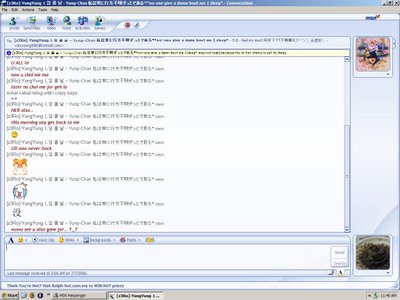My new project :
Crazy Stuffs by Crazy 4
Jul 23, 2006
Jul 22, 2006
Jul 20, 2006
Things to ponder
Number 10
Life is sexually transmitted.
Number 9
Good health is merely the slowest possible rate at which one can die.
Number 8
Men have two emotions: Hungry and Wanting Love. If you see him looking for love, make him a sandwich.
Number 7
Give a person a fish and you feed them for a day; teach a person to use the Internet and they won't bother you for weeks.
Number 6
Some people are like a Slinky.....not really good for anything, but you still can't help but smile when you shove them down the stairs.
Number 5
Health nuts are going to feel stupid someday, lying in hospitals dying of nothing.
Number 4
All of us could take a lesson from the weather. It pays no attention to criticism.
Number 3
Why does a slight tax increase cost you two hundred dollars and a substantial tax cut saves you thirty cents?
Number 2
In the 60's, people took acid to make the world weird. Now, the world is weird and people take Prozac to make it normal.
AND THE NUMBER 1 THOUGHT FOR 2006:
We know exactly where one cow with Mad-cow-disease is located among the millions and millions of cows in America but we haven't got a clue as to where thousands of illegal immigrants and terrorists are located. Maybe we should put the Department of Agriculture in charge of immigration.
Life is sexually transmitted.
Number 9
Good health is merely the slowest possible rate at which one can die.
Number 8
Men have two emotions: Hungry and Wanting Love. If you see him looking for love, make him a sandwich.
Number 7
Give a person a fish and you feed them for a day; teach a person to use the Internet and they won't bother you for weeks.
Number 6
Some people are like a Slinky.....not really good for anything, but you still can't help but smile when you shove them down the stairs.
Number 5
Health nuts are going to feel stupid someday, lying in hospitals dying of nothing.
Number 4
All of us could take a lesson from the weather. It pays no attention to criticism.
Number 3
Why does a slight tax increase cost you two hundred dollars and a substantial tax cut saves you thirty cents?
Number 2
In the 60's, people took acid to make the world weird. Now, the world is weird and people take Prozac to make it normal.
AND THE NUMBER 1 THOUGHT FOR 2006:
We know exactly where one cow with Mad-cow-disease is located among the millions and millions of cows in America but we haven't got a clue as to where thousands of illegal immigrants and terrorists are located. Maybe we should put the Department of Agriculture in charge of immigration.
Jul 16, 2006
340,282,366,920,938,000,000,000,000,000,000,000,000 new web addresses created by internet chiefs
. . . so we won’t run out of space soon, then
By Jonathan Richards
TO THE lay observer it seems like an infinite network of computers, servers and cables stretching around the globe.
But the worldwide web is filling up. So quickly, it turns out, that programmers have had to devise a new one.
Of the internet addresses available, more than three quarters are already in use, and the remainder are expected to be assigned by 2009. So, what will happen as more people in developing countries come online? The answer is IPv6, a new internet protocol that has more spaces than the old one: 340,282,366,920,938,000,000, 000,000,000,000,000,000 spaces, in fact. “Currently there’s four billion addresses available and there are six billion humans on Earth, so there’s obviously an issue there,” said David Kessens, chairman of the IPv6 working group at RIPE, one of five regional internet registries in charge of rolling it out.
Every device that is connected to the internet — websites, computers and mobile phones — needs an “internet address” to locate it on the network.
When the internet was developed in the 1980s, programmers had no idea how big it would become. They gave each address a “16-bit” number, which meant that the total number of available addresses worked out at about four billion (2 to the power of 32).
But as use grew, it became clear that the old protocol, IPv4, wasn’t big enough, so a new one was written based on “32-bit numbers”. That increased the number of available addresses to 340 undecillion, 282 decillion, 366 nonillion, 920 octillion, 938 septillion — enough for the foreseeable future, Mr Kessens said.
IPv6 does not involve any new cables being laid, nor will there be any burden on customers, for whom the change will appear seamless. It will, however, greatly improve the quality of certain internet services, in particular phone calls, which are not suited to IPv4.
“The big change is going to be in peer-to-peer services like gaming and file-sharing, which are going to become much easier to use,” Mr Kessens said.
Several service providers, including AOL and Yahoo!, have applied for space on the new network, and IPv6 is in use in some countries, including the Netherlands. But the big “driver” is likely to be the release next year of the new version of Microsoft Windows, Vista, which is understood to contain some IPv6-only applications. The US Government has told departments to make their systems “IPv6-ready” by 2008.
The Department of Trade and Industry said it was aware of the changeover, but that it was up to large providers to take the lead when it occurred.
Both protocols can work on the same network and IPv4 will not be decommissioned.
ONLINE, ON THE PHONE, ON THE UP
50 billion the number of e-mails dispatched every day wordwide; in 2001 the traffic was less than 12 billion
88 per cent of e-mails are junk including about 1 per cent which are virus-infected
32 The average number of e-mail messages received per person per day. This is rising by 84 per cent each year
440 million the number of electronic mailboxes in use, including 170 million corporate ones, growing by 32 per cent per year
1,035 million the total number of mobile phone text messages sent each month in Britain
37 The average number of texts a user sends per month compared with 21 in 2001 1 million the number of children aged under 10 in Britain — one in three — who own a phone
8 The average age at which a child gets a mobile phone in Britain
By Jonathan Richards
TO THE lay observer it seems like an infinite network of computers, servers and cables stretching around the globe.
But the worldwide web is filling up. So quickly, it turns out, that programmers have had to devise a new one.
Of the internet addresses available, more than three quarters are already in use, and the remainder are expected to be assigned by 2009. So, what will happen as more people in developing countries come online? The answer is IPv6, a new internet protocol that has more spaces than the old one: 340,282,366,920,938,000,000, 000,000,000,000,000,000 spaces, in fact. “Currently there’s four billion addresses available and there are six billion humans on Earth, so there’s obviously an issue there,” said David Kessens, chairman of the IPv6 working group at RIPE, one of five regional internet registries in charge of rolling it out.
Every device that is connected to the internet — websites, computers and mobile phones — needs an “internet address” to locate it on the network.
When the internet was developed in the 1980s, programmers had no idea how big it would become. They gave each address a “16-bit” number, which meant that the total number of available addresses worked out at about four billion (2 to the power of 32).
But as use grew, it became clear that the old protocol, IPv4, wasn’t big enough, so a new one was written based on “32-bit numbers”. That increased the number of available addresses to 340 undecillion, 282 decillion, 366 nonillion, 920 octillion, 938 septillion — enough for the foreseeable future, Mr Kessens said.
IPv6 does not involve any new cables being laid, nor will there be any burden on customers, for whom the change will appear seamless. It will, however, greatly improve the quality of certain internet services, in particular phone calls, which are not suited to IPv4.
“The big change is going to be in peer-to-peer services like gaming and file-sharing, which are going to become much easier to use,” Mr Kessens said.
Several service providers, including AOL and Yahoo!, have applied for space on the new network, and IPv6 is in use in some countries, including the Netherlands. But the big “driver” is likely to be the release next year of the new version of Microsoft Windows, Vista, which is understood to contain some IPv6-only applications. The US Government has told departments to make their systems “IPv6-ready” by 2008.
The Department of Trade and Industry said it was aware of the changeover, but that it was up to large providers to take the lead when it occurred.
Both protocols can work on the same network and IPv4 will not be decommissioned.
ONLINE, ON THE PHONE, ON THE UP
50 billion the number of e-mails dispatched every day wordwide; in 2001 the traffic was less than 12 billion
88 per cent of e-mails are junk including about 1 per cent which are virus-infected
32 The average number of e-mail messages received per person per day. This is rising by 84 per cent each year
440 million the number of electronic mailboxes in use, including 170 million corporate ones, growing by 32 per cent per year
1,035 million the total number of mobile phone text messages sent each month in Britain
37 The average number of texts a user sends per month compared with 21 in 2001 1 million the number of children aged under 10 in Britain — one in three — who own a phone
8 The average age at which a child gets a mobile phone in Britain
Jul 11, 2006
Jul 7, 2006
Jul 3, 2006
Subscribe to:
Posts (Atom)





















































